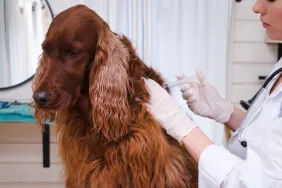The skepticism surrounding human vaccines has now infiltrated the pet owner community, inciting worries among vets about a potential rabies resurgence. Rabies — a virus that is almost invariably fatal — has been thrust back into the spotlight as certain pet owners contest the need for their dogs to receive vaccinations. These owners harbor concerns that vaccines could diminish their pets’ lifespan or even lead to conditions such as autism — a condition that is distinctively human and not recognized in canines.
Anti-vax pet owners advocate against rabies vaccine, leaving vets concerned
Experts are sounding alarms over the growing anti-vaccination sentiment among dog owners. They argue that this movement poses a particular risk given the dire public health implications of a rabies outbreak. Dr. Rena Carlson, president of the American Veterinary Medical Association (AVMA), highlighted the crucial role of the rabies vaccine in protecting both pets and the public. “It’s essentially 100% fatal. So having a rabies vaccine for your cat and dog is really, really important on many levels,” Carlson told USA Today. The spread of misinformation has led to an increasing number of pet owners questioning the safety and necessity of vaccines for their animals.
Dr. Matt Motta, a public health specialist, links this hesitancy to broader doubts about vaccines seen during the COVID-19 pandemic. Motta fears that the rejection of canine vaccines, particularly in areas where the law mandates them, could unravel successful health strategies that have kept rabies at bay for decades. A recent study co-authored by Motta found a startling level of distrust towards canine vaccines, with nearly 40% of dog owners surveyed deeming them unsafe.
The persistence of vaccine myths, such as the baseless association between vaccinations and autism in dogs, mirrors the misconceptions that have fueled human anti-vaccination movements. Despite assurances from experts that canine vaccines are overwhelmingly safe – with severe complications being extremely rare – these misconceptions continue to influence pet owner decisions, potentially compromising the achievements of long-standing rabies control efforts.









